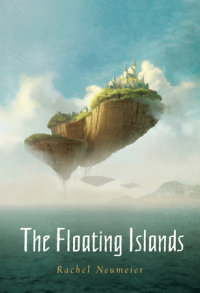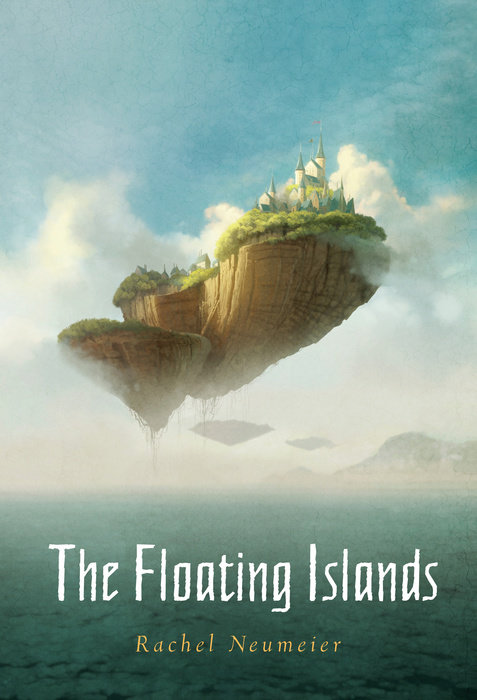The Floating Islands
When Trei loses his family in a tragic disaster, he must search out distant relatives in a new land. The Floating Islands are unlike anything Trei has ever seen: stunning, majestic, and graced with kajurai, men who soar the skies with wings.
Trei is instantly sky-mad, and desperate to be a kajurai himself. The only one who fully understands his passion is Araene, his newfound cousin. Prickly, sarcastic, and gifted, Araene has a secret of her own . . . a dream a girl cannot attain.
Trei and Araene quickly become conspirators as they pursue their individual paths. But neither suspects that their lives will be deeply entwined, and that the fate of the Floating Islands will lie in their hands. . . .
Filled with rich language, and told in alternating voices, The Floating Islands is an all-encompassing young adult fantasy read.
An Excerpt fromThe Floating Islands
Neumeier: THE FLOATING ISLANDS
1
Trei was fourteen the first time he saw the Floating Islands. He had made the whole long voyage south from Rounn in a haze of loss and misery, not really noticing the harbors in which the ship sometimes anchored or the sea between. But here, where both sea and sky lay pearl-gray in the dawn, the wonder of the Floating Islands broke at last into that haze.
A boy high in the rigging called out in a shrill voice, pointing, and then the deeper voice of an officer rang out and the ship smoothly adjusted its heading. Before them, the Islands rose shimmering out of the dawn mist. They stood high above the sea—too high, even in that first mist-shrouded glimpse. Then the early sun, rising, turned the air to gold and the sea to sapphire and picked the Islands out of the mist like jewels. In that light, they seemed too beautiful to hold terror or despair or anguish. Trei could hardly bear to look at them, yet could not bring himself to look away. He gripped the railing hard and bit his lip almost till it bled.
Each of the Floating Islands was broad on top, narrowing to points of jagged rock below. Trei found a place to sit among coiled ropes, near the bow of the ship, out of the way of the busy sailors. He propped his chin in his hands and watched the Islands grow larger as the morning passed. They only seemed more astonishing as the ship approached them. Trei could have believed that someone had painted them on a backdrop and the ship would eventually tear through the canvas to find, waiting, a far less magical scene.
The Islands proved to be farther away than Trei had first thought. All morning, while the dawn cool gave way to the heavy southern heat, the ship sailed toward the nearest of the Islands, drawing close at last only as the sun crested in the sky. Pastures scattered with grazing sheep were visible upon its heights as they approached it, and the fluted pillars of a temple. Trei found his eye persistently trying to fill in the slopes of a mountain below the floating stone, but no matter how he stared, the red rock ran out into nothing but empty air where the gulls wheeled.
Trei craned his neck back and stared upward as they passed under the Island. Drifting mist, contorted trees growing directly out of the rock, gulls’ nests, and the odd vein of white marble, all so high above there would have been room below for masts five times the height. Barely audible beyond the shrill cries of the gulls came the delicate thread of some unearthly melody.
“That’s only Talabri,” Mana said, stopping beside Trei. The burly sailor’s tone was dismissive; Trei looked at him with mute amazement that anyone could sound like that while sailing hardly a long stone’s throw from such a miracle.
“Sheep and shepherds, orchards and vineyards, temples and priests.” Mana waved Talabri away with scorn. He enjoyed talking and never minded Trei’s silence. Despite his own distracted indifference, Trei had come to like the sailor’s friendly one-sided conversation. “It’s peaceful, aye, but there’s nothing on Talabri to interest a man. Candera, now—where’s your family, lad, Candera?”
Trei closed his eyes briefly, wishing desperately that his family was on Candera, was anywhere at all in the living world. It took him a moment to manage anything like a normal tone. “Milendri. My uncle’s family.”
“Oh, Milendri! That’s lucky for you, lad, supposing you want to live on an island held up in the air by nothing but sky magic. But Milendri’s the greatest of all the Floating Islands, they say. Your uncle’s family lives in Canpra, I suppose, the king’s capital city, what’s his name—some up-and-down Island name, nothing but vowels from start to finish.”
The king of the Floating Islands was Terinai Naterensei, but Trei said nothing. His uncle’s family did indeed live in a city called Canpra, but Trei hadn’t really understood that this was anything special.
Mana, never deterred by Trei’s silence, went on cheerfully, “I hear Canpra’s a splendid city. Not that they let ships’ crews up, but they say the old king, three back, built it to rival even Rodounnè. Not that I believe it. But it’s true the bit you can see from the sea looks splendid enough.”
Trei wondered how a city would look if it was deliberately built to be splendid. In Tolounn, all the towns had just sort of grown up where people had once decided to settle, like the town of Rounn growing up around the Rounn River, where, according to family legend, Great-grandfather Meraunn had once made his fortune backing the new steamboats over ox-drawn keelboats. He found he was curious about this new city, but didn’t know exactly what to ask.
“We won’t see Milendri before tomorrow afternoon,” Mana rattled on. “We’ll be passing islands all day, of course. . . .”
But Trei was no longer listening. He had just caught sight of his first winged Island fliers, and had attention to spare for nothing else.
There were a dozen of them—no, Trei saw as they approached: fourteen. Fifteen. They flew as geese fly in the fall, in a formation like a spear point. At first the shape the winged men made was stark as a rune against the empty sky, but as they approached the ship, they broke their formation, wheeled, and circled low. The morning light caught in the feathers of their glorious wings, crimson as blood, except for one man whose wings were black as grief.
As the fliers passed above the ship, Trei saw how each man wore his wings like a strange kind of cloak. Crimson bands crossed the fliers’ arms and bodies. Though the wings looked like real wings, he saw clearly that the men were flying by some understandable kind of magic and were not actually winged people.

